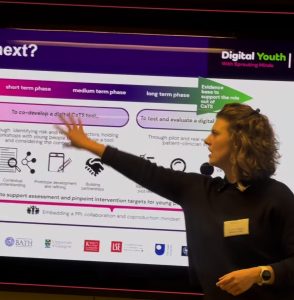Working in partnership: bringing youth mental health research into the real world

By Rowan Streckfuss-Davies, Research assistant based at the University of Oxford. Rowan supports with collaborative initiatives across the Digital Youth Programme.
In April, researchers and young people from the Digital Youth Programme and Sprouting Minds met at the Anna Freud Centre with partner representatives from charities and third sector organisations to discuss our shared interests and priorities for the future of youth mental health.
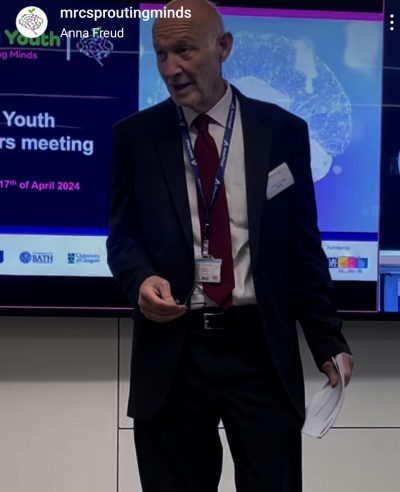
Researchers from the University of Nottingham, Kings College London, the University of Oxford and young people from Sprouting Minds, our Young Person’s Advisory Group, shared the results of their ongoing research projects, inviting partners to ask questions and contribute their thoughts during extended discussion sessions.
“Young people need the skills to be agents in their own lives, and our job is to help develop those skills.”[1]
[1] Jonathan Baggaley, Head of PSHE Association
Values and problems of AI in the youth digital world
Professor Chris Greenhalgh and Dr Petr Slovak shared their research from Work Package 5 and Work Package 7. Together with members of Sprouting Minds, they explored how young people use and think about AI, opening a discussion about the values and problems with artificial intelligence in young people’s digital worlds.
While young people said that they viewed AI as a “general purpose” technology and use it regularly for schoolwork, many said that they feel concerned about the role of AI in misinformation, cheating, and the production of harmful “deep fakes”.
Work Package 5 has aimed to harness the popularity of AI chatbots like ChatGPT to help with mental health, such as encouraging people to complete a treatment intervention. Petr and Chris outlined some of the issues around ethics, assumptions, and the quality of outputs that need to be considered when training and relying on AI chatbots for mental health.
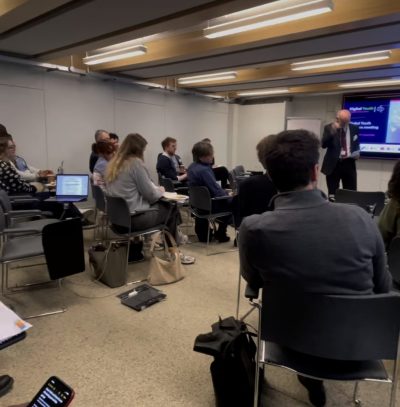
Looking to the future
The future of artificial intelligence and its impact on young people’s mental health is a key concern for researchers, partners, and young people themselves. Petr and Chris shared their priorities for using AI in mental health interventions and how they see the next steps in the field. The possibilities for using large language models such as chatbots will continue to grow, and using AI to assist, rather than replace, clinicians in therapeutic contexts is an important area for development and research.
Interventions for self-harm: CaTS-APP
In the second of the day’s sessions, we heard from Dr Jo Lockwood and Dr Camilla Babbage from the University of Nottingham, and young people from Sprouting Minds about the progress of Work Package 8 – developing the card sort task for self-harm (CaTS) into a co-designed app.
Jo and Camilla introduced the principles behind CaTS, which uses a series of cards with thoughts, feelings, and events to help young people map out their experiences of self-harm episodes. It can be difficult to facilitate collaborative processes for addressing self-harm, as it is complex and can be influenced by many different factors. Using the CaTS cards to build up timelines of self-harm experiences can help young people to recognise patterns of emotions and behaviours.
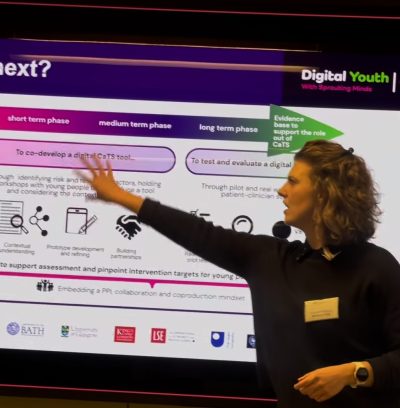
Co-designing the CaTS-APP
The digital version of CaTS – the CaTS-APP – is currently in an early stage of co-design with input from the project’s patient and public involvement group. Jo and Camilla meet with the group each month using open access tools like Jamboard to help keep sessions productive and engaging.
Early findings from stakeholder input showed that the CaTS-APP fills a need in healthcare, social care, education, and third sector domains. Interviews with stakeholders also found that many felt the app could help promote collaboration, understanding, and compassion while centring lived experience.
The next steps for CaTS-APP
Several co-production workshops have been held to gauge opinion on using the app in different settings. Workshops found that CaTS-APP could help foster communication between young people and providers. The next steps for the project are to co-develop, pilot, and evaluate the CaTS-APP with young people.
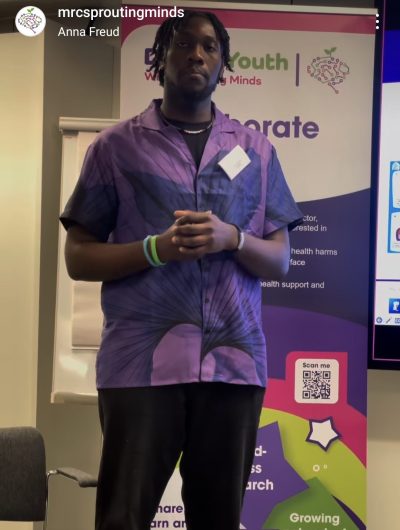
What works for young people in research?
Reflecting on their involvement with the CaTS-APP project, Sprouting Minds felt that the process was a positive experience. While consistently getting together was occasionally a challenge, the digital tools that the group used were particularly helpful. Young people were often able to engage with the research in their own time, and using online platforms prevented the process from feeling too “academic”.
“We have lots of knowledge – it just needs to be distributed out there”[2]
Anna Freud CEO and Digital Youth Partners Board Chair, Prof Peter Fonagy, closed out the day with the key takeaway for researchers and partners in youth mental health: above all, researchers and partners must ensure young people feel met where they are and are kept at the heart of what we do as advocates for youth mental health.
[1] Jonathan Baggaley, Head of PSHE Association
[2] Koa Health
Images courtesy of Belinda Kaur and Emmanuel Wokomah.
If you would like to find out more about the Digital Youth Programme and Sprouting Minds, or you are interested in partnering with us, please visit our website www.digitalyouth.ac.uk or email hello@digitalyouth.ac.uk
